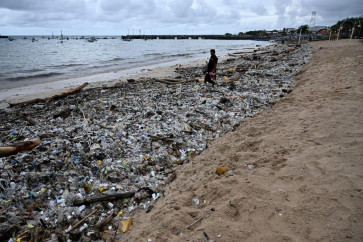The role of social workers in improving Indonesia’s social welfare
The pandemic has brought to light systemic issues in our social welfare, not least of which is a shortage in social workers.
Change text size
Gift Premium Articles
to Anyone

D
eveloped countries are known for the concept of the welfare state. Countries that adhere to this ideology believe in a welfare system in which the government is obligated to provide comprehensive and universal welfare for its citizens. Throughout history, they dedicate their gross domestic product spending to social welfare programs and community assistance with the help of social workers.
Countries like Canada, which ranked among the top 10 countries in the world for best quality of life in 2022, have a strong social safety net to ensure that people are cared for through access to health care and education. It has a well-established system for wellness and basic necessities, as the government provides the facility for individuals to care for society.
The Canadian system provides security for pensions, people with disabilities and a support system for people with specific life problems, such as divorce, health conditions, domestic violence, marginalization, gerontology, as well as other facilities for people in need of welfare. Its healthcare access and its programs for mental health and people with disabilities are the initiatives that brought them to be a first-world country.
The profession of social work has gained recognition in recent years as a global profession based on human rights capable of addressing a variety of problems and difficulties faced by urban and rural communities around the world. Social workers are able to develop and broaden collaborations with local professionals and programs to promote comprehensive, culturally competent services, even as the world community continues to struggle with health inequities, poverty, an increase in orphans and vulnerable children, gender-based violence and related critical issues.
Today, the rationale behind social work is that there is no taboo about becoming a social worker. It is an essential part of our society. Even though it is only applied in first-world countries like Canada, it doesn’t mean that the other parts of the world do not need social workers to help the community.
Indonesia has a population of 279 million people and is rich in culture, religion, ethnicity, languages and natural and human resources. However, it is still dealing with the most fundamental socioeconomic challenges, such as poverty, starvation, drug abuse, child welfare, a growing elderly population and equitable access to basic needs, from stable incomes to food and housing (Fahrudin & Yusuf, 2016).
Even though social issues are a great concern in Indonesia, the country has only 68,754 social workers. This means there are only 80 social workers for every 100,000 children (UNICEF Indonesia, 2020).
I had never heard of or even met a social worker while growing up in Indonesia.
One of the biggest challenges we are facing after the pandemic is a rise in systemic issues as a result of social instability and the global economic crisis. Life after the pandemic has left our country with the biggest pitfalls, as children have lost their parents and families are not prepared to deal with the situation psychologically or economically.
According to the statistics issued recently by the Women’s Empowerment and Child Protection Ministry and UNICEF, 25,430 Indonesian children have lost one or both parents to COVID-19 since the start of the pandemic. The majority of children (57 percent) have lost a male caregiver, followed by 37 percent who have lost a female caregiver and 5 percent who have lost both, leaving them unaccompanied and not under the care of any adult. Meanwhile, the majority of these children are being cared for by female caregivers and other relatives in their extended families (UNICEF Indonesia, 2021).
The children in this situation are exposed to the risks of trauma, economic challenges, inability to continue their education and ambiguity in the system designed to protect them. Indonesia needs to consider the long-term impacts of these challenges on the nation’s social welfare system. The government should expand the coverage of social assistance program to include family members caring for children who have lost a caregiver to COVID-19, especially vulnerable women and girls, so they can continue their education and to strengthen the family’s role to ensure that children remain in family-based care (Gabel, 2014).
Indonesia needs to acknowledge these systemic issues regarding social assistance and prioritize the social rights of people to be provided with care and protection. One action plan is to advocate, educate and place more social workers in the community to help protect these marginalized and vulnerable populations.
***
The writer is pursuing a master degree at the Factor-Inwentash Faculty of Social Work at the University of Toronto.









